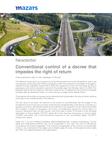
Conventional control of a decree that impedes the right of return
The National Government, as a measure to control the spread of the Covid-19 pandemic, and in use of the powers conferred by the Political Constitution within the framework of the States of Exception, ordered, through Legislative Decree 439 of 2020, the suspension of entry into Colombian territory of passengers coming from abroad for a period of 30 calendar days from Monday, March 23, 2020. This legislative decree will be subject to automatic review by the Constitutional Court and its knowledge corresponded, by distribution made in a virtual hearing, to Judge Diana Fajardo Rivera.
The purpose of this article is to present some elements that must be taken into account when studying and ruling on the constitutionality of this decree.
The first issue to be taken into account is the control of conventionality that the judges of the Constitutional Court must carry out when examining the constitutionality of the decree. Colombia is a signatory to several international treaties and conventions that recognize human rights and prohibit their limitation in states of emergency. All of them unconditionally express the human right of a country's nationals to return to their country. This is the case of article 13 numeral 2 of the Universal Declaration of Human Rights ("UDHR"), article 22.5 of the American Convention on Human Rights ("ACHR") and article 13.2 of the International Covenant on Civil and Political Rights ("ICCPR"), among many others.
Article 214 n. 2 of our Political Constitution clearly establishes that, in states of emergency, "human rights and fundamental freedoms may not be suspended. In any case, the rules of international humanitarian law shall be respected". This is where the application of the control of conventionality comes in, as a mechanism that judges use to directly apply the rules of international human rights law ("IHL") as integral elements of our legal system.
The second issue to consider is, by virtue of the control of conventionality, the mandatory application by the national judge of the guiding principles of IHL, which are part of an imperative or peremptory law that does not admit of discussion (ius cogens). One of these principles is the "pro-person" principle, which is regulated in Article 29 of the ACHR, which establishes that "the norms contained in the ACHR may not be interpreted in such a way as to limit or suppress the exercise and enjoyment of the rights recognized in the Convention" (Gil Botero, Enrique. The control of conventionality in Colombia. P. 67). The Constitutional Court, in Judgment T-191 of 2009 (M.P. Luis Ernesto Vargas Silva), has expressly recognized the existence of this principle and has considered that prevalence must be given "to that interpretation that seeks respect for human dignity and consequently for the protection, guarantee and promotion of human rights and constitutional rights".
The third issue is to transcend from the theoretical to the practical and recommend the Court to act in accordance with its own jurisprudence. Although this is atypical, since public functions are clearly regulated, this entity cannot ignore the fact that there are currently approximately 1,500 Colombians abroad who have not been able to exercise their human right to enter the country.
In Ruling T-349 of August 27, 1993, the Court indicated that, "in the face of a potential violation that appears imminent and close (...) the protective function of the judge consists of avoiding it". Similarly, in Ruling T-719 of 2003, the Court determined that "the authorities must act in a particularly diligent manner with respect to these subjects, interpreting the scope of their own functions with an eminently protective criterion (...)". This is enhanced when the threat is classified as extreme, that is, when there is a high risk that the right to life may be extinguished. In this sense, the Constitutional Court must assume an activist role of exceptional executor and order, informally, the protection of the human rights of Colombian citizens who have not been able to exercise their fundamental and human right to return to their country.


